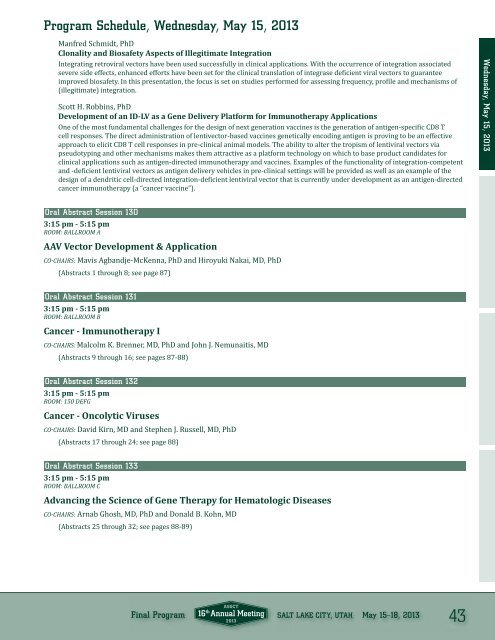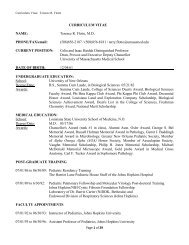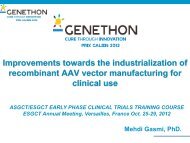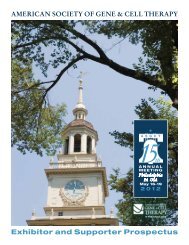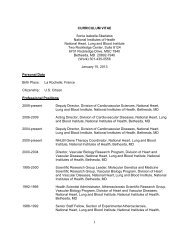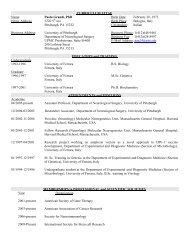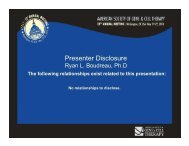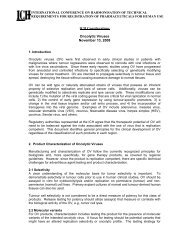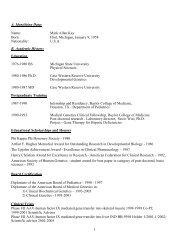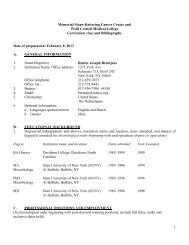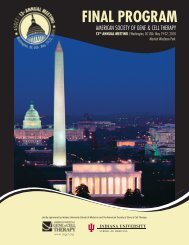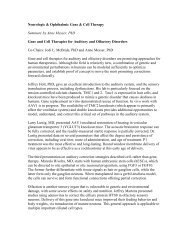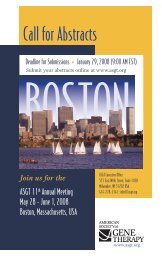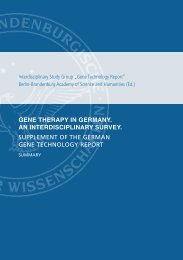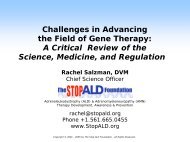Final Program - American Society of Gene & Cell Therapy
Final Program - American Society of Gene & Cell Therapy
Final Program - American Society of Gene & Cell Therapy
You also want an ePaper? Increase the reach of your titles
YUMPU automatically turns print PDFs into web optimized ePapers that Google loves.
<strong>Program</strong> Schedule, Wednesday, May 15, 2013<br />
Manfred Schmidt, PhD<br />
Clonality and Biosafety Aspects <strong>of</strong> Illegitimate Integration<br />
Integrating retroviral vectors have been used successfully in clinical applications. With the occurrence <strong>of</strong> integration associated<br />
severe side effects, enhanced efforts have been set for the clinical translation <strong>of</strong> integrase deicient viral vectors to guarantee<br />
improved biosafety. In this presentation, the focus is set on studies performed for assessing frequency, proile and mechanisms <strong>of</strong><br />
(illegitimate) integration.<br />
Scott H. Robbins, PhD<br />
Development <strong>of</strong> an ID-LV as a <strong>Gene</strong> Delivery Platform for Immunotherapy Applications<br />
One <strong>of</strong> the most fundamental challenges for the design <strong>of</strong> next generation vaccines is the generation <strong>of</strong> antigen-speciic CD8 T<br />
cell responses. The direct administration <strong>of</strong> lentivector-based vaccines genetically encoding antigen is proving to be an effective<br />
approach to elicit CD8 T cell responses in pre-clinical animal models. The ability to alter the tropism <strong>of</strong> lentiviral vectors via<br />
pseudotyping and other mechanisms makes them attractive as a platform technology on which to base product candidates for<br />
clinical applications such as antigen-directed immunotherapy and vaccines. Examples <strong>of</strong> the functionality <strong>of</strong> integration-competent<br />
and -deicient lentiviral vectors as antigen delivery vehicles in pre-clinical settings will be provided as well as an example <strong>of</strong> the<br />
design <strong>of</strong> a dendritic cell-directed integration-deicient lentiviral vector that is currently under development as an antigen-directed<br />
cancer immunotherapy (a “cancer vaccine”).<br />
Wednesday, May 15, 2013<br />
Oral Abstract Session 130<br />
3:15 pm - 5:15 pm<br />
ROOM: BALLROOM A<br />
AAV Vector Development & Application<br />
CO-CHAIRS: Mavis Agbandje-McKenna, PhD and Hiroyuki Nakai, MD, PhD<br />
(Abstracts 1 through 8; see page 87)<br />
Oral Abstract Session 131<br />
3:15 pm - 5:15 pm<br />
ROOM: BALLROOM B<br />
Cancer - Immunotherapy I<br />
CO-CHAIRS: Malcolm K. Brenner, MD, PhD and John J. Nemunaitis, MD<br />
(Abstracts 9 through 16; see pages 87-88)<br />
Oral Abstract Session 132<br />
3:15 pm - 5:15 pm<br />
ROOM: 150 DEFG<br />
Cancer - Oncolytic Viruses<br />
CO-CHAIRS: David Kirn, MD and Stephen J. Russell, MD, PhD<br />
(Abstracts 17 through 24; see page 88)<br />
Oral Abstract Session 133<br />
3:15 pm - 5:15 pm<br />
ROOM: BALLROOM C<br />
Advancing the Science <strong>of</strong> <strong>Gene</strong> <strong>Therapy</strong> for Hematologic Diseases<br />
CO-CHAIRS: Arnab Ghosh, MD, PhD and Donald B. Kohn, MD<br />
(Abstracts 25 through 32; see pages 88-89)<br />
<strong>Final</strong> <strong>Program</strong> SALT LAKE CITY, UTAH May 15–18, 2013<br />
43


